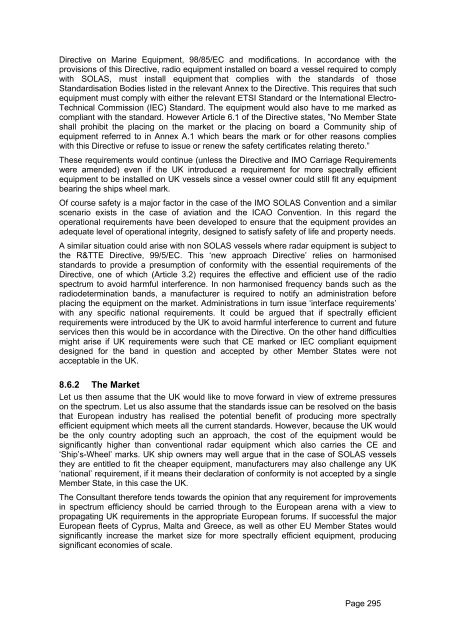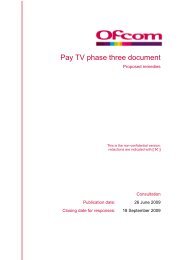FINAL REPORT - Stakeholders - Ofcom
FINAL REPORT - Stakeholders - Ofcom
FINAL REPORT - Stakeholders - Ofcom
You also want an ePaper? Increase the reach of your titles
YUMPU automatically turns print PDFs into web optimized ePapers that Google loves.
Directive on Marine Equipment, 98/85/EC and modifications. In accordance with the<br />
provisions of this Directive, radio equipment installed on board a vessel required to comply<br />
with SOLAS, must install equipment that complies with the standards of those<br />
Standardisation Bodies listed in the relevant Annex to the Directive. This requires that such<br />
equipment must comply with either the relevant ETSI Standard or the International Electro-<br />
Technical Commission (IEC) Standard. The equipment would also have to me marked as<br />
compliant with the standard. However Article 6.1 of the Directive states, ”No Member State<br />
shall prohibit the placing on the market or the placing on board a Community ship of<br />
equipment referred to in Annex A.1 which bears the mark or for other reasons complies<br />
with this Directive or refuse to issue or renew the safety certificates relating thereto.”<br />
These requirements would continue (unless the Directive and IMO Carriage Requirements<br />
were amended) even if the UK introduced a requirement for more spectrally efficient<br />
equipment to be installed on UK vessels since a vessel owner could still fit any equipment<br />
bearing the ships wheel mark.<br />
Of course safety is a major factor in the case of the IMO SOLAS Convention and a similar<br />
scenario exists in the case of aviation and the ICAO Convention. In this regard the<br />
operational requirements have been developed to ensure that the equipment provides an<br />
adequate level of operational integrity, designed to satisfy safety of life and property needs.<br />
A similar situation could arise with non SOLAS vessels where radar equipment is subject to<br />
the R&TTE Directive, 99/5/EC. This ‘new approach Directive’ relies on harmonised<br />
standards to provide a presumption of conformity with the essential requirements of the<br />
Directive, one of which (Article 3.2) requires the effective and efficient use of the radio<br />
spectrum to avoid harmful interference. In non harmonised frequency bands such as the<br />
radiodetermination bands, a manufacturer is required to notify an administration before<br />
placing the equipment on the market. Administrations in turn issue ‘interface requirements’<br />
with any specific national requirements. It could be argued that if spectrally efficient<br />
requirements were introduced by the UK to avoid harmful interference to current and future<br />
services then this would be in accordance with the Directive. On the other hand difficulties<br />
might arise if UK requirements were such that CE marked or IEC compliant equipment<br />
designed for the band in question and accepted by other Member States were not<br />
acceptable in the UK.<br />
8.6.2 The Market<br />
Let us then assume that the UK would like to move forward in view of extreme pressures<br />
on the spectrum. Let us also assume that the standards issue can be resolved on the basis<br />
that European industry has realised the potential benefit of producing more spectrally<br />
efficient equipment which meets all the current standards. However, because the UK would<br />
be the only country adopting such an approach, the cost of the equipment would be<br />
significantly higher than conventional radar equipment which also carries the CE and<br />
‘Ship’s-Wheel’ marks. UK ship owners may well argue that in the case of SOLAS vessels<br />
they are entitled to fit the cheaper equipment, manufacturers may also challenge any UK<br />
‘national’ requirement, if it means their declaration of conformity is not accepted by a single<br />
Member State, in this case the UK.<br />
The Consultant therefore tends towards the opinion that any requirement for improvements<br />
in spectrum efficiency should be carried through to the European arena with a view to<br />
propagating UK requirements in the appropriate European forums. If successful the major<br />
European fleets of Cyprus, Malta and Greece, as well as other EU Member States would<br />
significantly increase the market size for more spectrally efficient equipment, producing<br />
significant economies of scale.<br />
Page 295
















